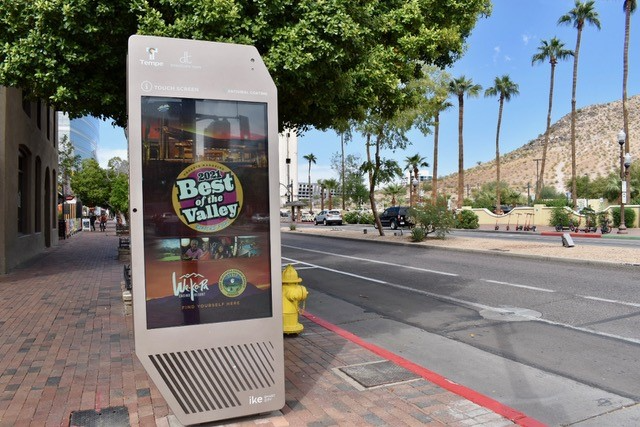Over the past two years, local nonprofit Downtown Phoenix, Inc. led city officials in search for ways to make civic resources, such as job postings, interactive maps and wifi hotspots, more accessible for people who learn, work and visit downtown. Here’s what DPI proposed: the City of Phoenix could install eight to 10 digital kiosks downtown to help people navigate real-time transit information, updated events listings and local business options. DPI and its affiliate organizations want kiosks ready to use before the Super Bowl in February 2023, said DPI President and CEO Devney Preuss.
Each kiosk will pay for itself, said Chris Ewell, deputy director of Street Transportation for the City of Phoenix.
Funding for the program, as well as application design, would come from a private vendor, who sells advertising space on the kiosks, he said. Advertisements appear when kiosks are not being used.
READ ALSO: Here’s how ASU Downtown Phoenix has transformed the city
Phoenix could be the third city across the Valley to install interactive kiosks, following Tempe and Mesa, said Kini Knudson, director of Street Transportation for the City of Phoenix.
Digital kiosks are designed to benefit all pedestrians, said Anna Baerman, development director for Interactive Kiosk Experience Smart City. They offer ADA compliant functionality, a mobile hand-off solution that is approved by the National Federation of the Blind and translation in up to 100 languages.
“This is a great example of how we can bring our government into the 21st century,” said Councilperson Ann O’Brien, who represents District 1.
Revenue generated from the kiosks will be split between the kiosk vendor and the city, which distributes money to local services like police, parks and libraries, said Councilperson Debra Stark, who represents District 3.
Installation would require the council to change an existing city ordinance, which prohibits advertising within public spaces.
The City Council recently approved a similar exception to allow advertising on billboards downtown that are displayed on land over city highways, railways and powerlines, Knudson said. Staff can replicate that language for the digital kiosk program.
IKE Smart City, a Colorado-based media company, is one of the vendors interested in contracting with the city to construct, install and maintain digital kiosks, Baerman said.
To engage with the kiosk program, IKE Smart City joined Phoenix Community Alliance, the business leadership advocacy affiliate of DPI, Preuss said.
“We actually engineered our kiosks to be able to withstand the temperatures that a desert environment sees,” Baerman said.
The company, a subsidiary of Orange Barrel Media, currently operates kiosks in 10 cities nationwide, including Tempe, she said. It also provides cities with analytics for officials to evaluate how often the kiosks are used and which applications are the most popular.
“Digital wayfinding is a very important element in modern day cities,” Baerman said.
Earlier this year, a divided city council in Houston voted to install more than 300 kiosks by 2022, according to a January 2020 press release from Dallas Area Rapid Transit, the transportation authority in North Texas. Seventy-five kiosks have been installed since.
The City of Houston’s contract with IKE Smart City guarantees the local government at least $1 million each year from a shared-revenue agreement.
The Street Transportation Department requested feedback from city councilpersons about moving forward with the potential pilot program at September’s Transportation, Infrastructure and Planning subcommittee meeting.
“Tempe is a great example of a city that has become really walkable and it’s because they use tools to incentivize people to get out of their cars and go experience Mill Avenue,” Stark said, noting a similar vision for downtown Phoenix.
Councilperson Betty Guardado, who represents District 5, suggested installing kiosks around Phoenix universities, as well as the 10.5-acre site of a former KMart at 27th and Northern avenues, referring to it as “Innovation 27.” Councilperson Anne O’Brien inquired about kiosk installation at the MetroCenter as light rail construction is underway to connect downtown with a line that currently ends at 19th Ave and Dunlap St.
In 2015, Downtown Phoenix Partnership, the business improvement district affiliated with DPI, removed decades-old concrete kiosks with posters about upcoming events and performances due to damages that were beyond repair, said Preuss, who is also the interim executive director for DPP.
“The partnership services 90 city blocks, and to have kiosks on high traffic intersections will be just complimentary to the work of our ambassador program,” Preuss said.
Downtown Phoenix Ambassadors are employees of DPP’s Field Services Team who provide directions and dining recommendations to downtown visitors. They wear orange shirts with “Ask Me” on the back in high-traffic pedestrian areas downtown.
Phoenix officials and business executives alike expressed interest in implementing the digital kiosks to city areas that are outside of downtown. Talks for a program expansion will depend on results from the pilot installation.
The downtown digital kiosks program will be further discussed at October’s Economic Development and Equity subcommittee meeting.
A contract for kiosk deployment between the selected vendor and the City of Phoenix is expected to go before the city council as soon as this fall.




